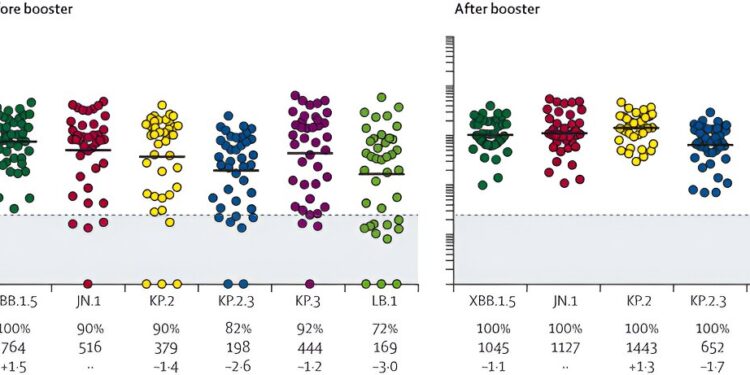Humoral immune responses after omicron JN.1 mRNA vaccination. Credit: Lancet infectious diseases (2024). DOI: 10.1016/S1473-3099(24)00603-0
The autumn wave of the coronavirus is sweeping across Germany. Affected people mainly suffer from coughs, colds, sore throats and fever, but also headaches, pain in the limbs, general weakness and shortness of breath. Because new variants and subtypes of SARS-CoV-2 are constantly emerging, coronavirus vaccines must be constantly adapted, much like flu viruses.
Currently, the omicron viral variant JN.1 and its sublineages KP.2 and KP.3 are predominant. Since August this year, the Comirnaty omicron JN.1 vaccine from BioNTech/Pfizer, adapted to the current variants, has been on the market in Germany. A study by the Department of Rheumatology and Immunology at the Medical Faculty of Hannover (MHH) has scientifically proven the effectiveness of the new omicron booster.
In cooperation with the German Primate Center in Göttingen, the researchers published the first article on this topic in Lancet infectious diseases.
The Spike protein model
The new booster is another mRNA vaccine, so it is made of messenger RNA. The principle: mRNA contains the genetic information necessary for the development of the so-called Spike protein, which is found on the surface of the coronavirus and helps the virus enter cells. The immune system recognizes the protein as foreign, triggers a defense reaction and develops immune protection.
Comirnaty omicron JN.1 is a so-called monoclonal vaccine, that is to say it contains only the mRNA of this omicron variant. At the end of June, the European Medicines Agency (EMA) recommended marketing authorization for the new COVID-19 mRNA vaccine based on the JN.1 spike protein.
“However, data on the immune response in humans or evidence from practice on vaccine-induced protection were still pending until our study,” explains Professor Dr Alexandra Dopfer -Jablonka, chief physician, who leads the immune study with his clinical colleague, Prof. Dr. Georg Behrens.
Protection against serious disease progression
To obtain such data, researchers measured the immune response of 42 MHH employees who had been vaccinated with the new vaccine as part of the COVID-19 Contact (CoCo) study, which has been ongoing since the start of the COVID-19 pandemic. coronavirus. Result: Around two weeks after vaccination with the new booster, antibodies against the current omicron variant increased significantly.
Professor Behrens emphasizes that the participants already had a high level of immunity against various variants of SARS-CoV-2 due to previous vaccinations and the fact that they survived corona infections, and adds: “However, we assume that the new omicron JN.1 mRNA vaccine will protect against hospitalization and post-COVID sequelae caused by most current viral variants.
According to the Standing Committee on Vaccination (Stiko), a booster vaccination with the new adapted vaccine is recommended for everyone aged 60 or over. In addition, anyone at particular risk of severe disease progression due to an underlying illness should receive a booster shot. Stiko also recommends booster vaccination for residents of nursing homes and employees in the care and health care sector. The booster vaccination must be repeated every year, as with the flu vaccination.
Vaccine makers BioNTech/Pfizer and Moderna are already working on a combination vaccine offering simultaneous protection against coronaviruses and influenza viruses.
More information:
Christine Happle et al, Humoral immunity after SARS-CoV-2 omicron JN.1 mRNA vaccination, Lancet infectious diseases (2024). DOI: 10.1016/S1473-3099(24)00603-0
Provided by Medizinische Hochschule Hannover
Quote: A study confirms the effectiveness of the new omicron booster (September 26, 2024) retrieved September 26, 2024 from
This document is subject to copyright. Except for fair use for private study or research purposes, no part may be reproduced without written permission. The content is provided for informational purposes only.



